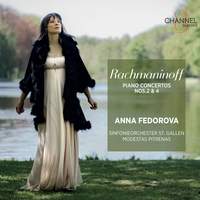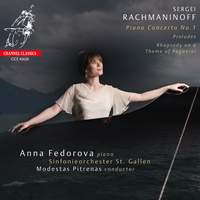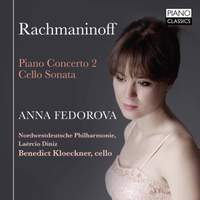Interview,
Anna Fedorova on Rachmaninoff concertos and the Davidsbündler Academy
 Ukrainian pianist Anna Fedorova recently released her new recording of Rachmaninoff's most famous piano concerto, No. 2 in C minor on Channel Classics - in fact her second recording of the work, following one in 2015 on Piano Classics.
Ukrainian pianist Anna Fedorova recently released her new recording of Rachmaninoff's most famous piano concerto, No. 2 in C minor on Channel Classics - in fact her second recording of the work, following one in 2015 on Piano Classics.
I took the opportunity to ask her about her approach to Rachmaninoff (as well as the impact of her phenomenally widely-viewed YouTube video of the C minor concerto), and also to discuss some of the work that she's been doing in the wake of the Russian invasion, both to help raise relief funds through benefit concerts and to arrange accommodation and tuition for refugee Ukrainian music students.
Your recently-released double-bill of Rachmaninoff concertos features the famous and widely-recorded No. 2 in C minor. Are there any particular accounts of this work by other pianists that have influenced your own approach to performing it – and how much has that approach changed since you recorded it for Piano Classics in 2015?
With Rachmaninoff in general, it's been quite a long journey for me; he's been a big part of my repertoire for the last ten years or so. I was about 20 when I played the second piano concerto for the first time, and then started gradually adding the others. This was also partly because the performance of the second concerto in the Concertgebouw went so well - as a result of this series, which is recorded and broadcast on YouTube and on Avotros Klassiek every year, the channel invited me to do a whole Rachmaninoff cycle. That finished earlier this year, in May, when I played the fourth concerto.
Of course I've been listening to a lot of performances - when I was younger, I loved the performances by Van Cliburn of No.3, for example, and Horowitz and Martha Argerich too. I also love Daniil Trifonov's performances - he's my favourite pianist from my own generation of pianists.
When I'm working on the piece I like to listen to different interpretations, but in the end I come up with my own; sometimes, in fact, I don't listen to other performances that much, unless maybe it’s a new and unheard modern piece where I'm learning how it sounds! Whereas for these concertos of course we all know the music. I really just try to feel it myself and come up with my own interpretation.
We're now on the second volume (after the first concerto with the Paganini Rhapsody), with the second and fourth concertos. The third will be the third concerto with the Morceaux de fantaisie, Op. 3. That will make a complete set of all the Rachmaninoff concertos with Channel Classics, which should be ready just in time for the 150th anniversary in 2023.
I don't think anything has changed drastically since the 2015 recording; the feeling of the piece is always different. Even from one day to the next - after I'd played that concert in the Concertgebouw, the next day it would already be different. Of course I hope that in the eight years or so since the previous recording I've developed as a musician and as an interpreter - and naturally I've played this concerto a lot with different orchestras and conductors, and the collaboration with different musicians teaches me a lot in terms of approaches and visions and ideas.
The Channel Classics recording with Jared Sacks was a particularly inspiring process; when I was recording the concerto the first time, it was one of my first CD recordings and I was still very young and inexperienced, and I'm not sure that my creative level during the sessions was the same as it is now. The presence of the microphones and the feeling that you're recording something that will exist forever can make you hyper-aware of every mistake you might make. And that's not the right thing to be thinking about while you're making music! With Jared the wonderful thing is that he basically gives the artist full freedom, and always tries to cultivate not just the notes but the most inspired version of the music.
The release notes to the album observe that “with over 35 million views, Anna Fedorova's live performance of Rachmaninoff's 2nd Piano Concerto is the most viewed classical concerto video on YouTube.” How important are YouTube and other online media for you in reaching audiences?
Well, it's an interesting thing I mention in my biography because it's unusual to have so many views on YouTube, and of course it gives a big reach. It probably enables a lot of people who don't normally listen to classical music to get into it, which is a great thing because we're always trying to reach new audiences.
I don't do anything special on that front - naturally some invitations might come my way on the strength of that recording, and sometimes people ask me to play that concerto because it's the one everyone knows me for, and I don't mind because it's a piece I love playing no matter how many times I play it.
I'm not sure how happy I am with that performance now, as it's only the second or third time I'd ever played the concerto on stage! But I do remember that there were some very special moments during the performance, between me and the conductor.
Anna Fedorova performs Rachmaninoff's Piano Concerto No. 2, with the Nordwestdeutsche Philharmonie under Martin Panteleev
Since the Russian invasion of Ukraine began, you’ve been organising concerts to raise funds for humanitarian aid to the victims. Can you tell us more about how you approached this and what the response has been?
It all began a week after the war started - I remember that for the very first few days we were all just in shock, completely paralysed and glued to the screens watching the news, calling all our friends and families, and contacting my parents' students and everyone I knew in Ukraine.
But then I realised that just being terrified wasn't enough, and that as musicians we could help. I was in touch with Simon Reinink, the Managing Director of the Concertgebouw, and I suggested a benefit concert. From those initial messages and calls to the concert itself took about a week - he had to speak with some people from the Board, and then we had to put it on the website and the PR had to happen, but in 30 hours all the tickets had been sold and oversold. It's the fullest I've seen the Concertgebouw in my life – there were people sitting on the stage, around the musicians, everywhere.
Many other musicians had had the same idea. This concert in the Concertgebouw, and also one in Amare (the new concert hall in the Hague), were both on the same day and both were completely sold out. The Concertgebouw one was also televised and went out on the radio and on YouTube, so it got a lot of exposure. We had half of the Concertgebouw orchestra joining us as part of the ensemble for this concert, plus many soloists who had come in from Germany and France to perform with us, and of course the Dutch-based musicians. After that it was very easy to organise more concerts - in Tivoli, in Germany and elsewhere, in Spain, in Austria, in Turkey and elsewhere.
The biggest Ukraine-related project of course was the tour with the Ukrainian Freedom Orchestra, which I had nothing to do with actually organising but I was performing Chopin's second concerto with them. It was amazing to be part of this project, which was organised by the Metropolitan Opera's director and the Polish National Theatre, and managed by Askonas Holt. The orchestra was all Ukrainian musicians; from Ukrainian orchestras, people who had moved to Poland at the start of the war, and people who were already playing in international orchestras.
As part of your humanitarian efforts, you are also making it possible for ten young (8-19-year-old) and very talented Ukrainian refugees to continue their piano studies in the Netherlands. How did the Davidsbündler Music Academy come about? And how do you solve issues about their housing (with pianos!), education fees, and possible language barriers?
It's a lot of different things to think about. The Academy itself actually started well before the war. It's still relatively new - it opened in September 2022 - but the preparatory work started a year and a half ago when my husband and I had the idea.
When the war started, the building wasn't yet ready, but all the plans had been laid so we were able to open in September. We had originally been planning to open it to any nationality of student, and to have some scholarships; we expected there to be some Ukrainians there, of course, but at that point we didn't know there would be so many. Many of my parents' students (they are both piano professors, who were still teaching in conservatory and pre-conservatory music school) had already come to the Netherlands - when things started looking scary in February I just panicked and told them "come to the Netherlands and we'll figure it out".
I went on a classical music TV show in the Netherlands and made an announcement saying that if there were people who would like to host young talented musicians from Ukraine, and who have instruments - pianos, of course, but not only pianos since it was not just pianists who were coming - they should make themselves known. In this way we were able to find all the young musicians - and some professional musicians as well - places to stay and have a piano. In fact, most of them ended up with a grand piano rather than an upright!
Now, though, it's becoming more complicated; people opened their doors and were very hospitable, and some of them have said that the musicians can stay for as long as they need, but some are asking whether they can find somewhere new. So we're again searching for kind people with instruments. We're managing so far.
Some conservatoires in continental Europe teach primarily in English despite not being in English-speaking countries; what language are students actually taught in at the Academy?
The main piano professors are my parents, who can teach in English, Ukrainian or Russian, so for Ukrainian pianists it's fine - though of course many of them speak English as well. They will have had other studies and lectures and masterclasses, where generally you need to speak English. Some are also now learning Dutch because they've started attending Dutch schools.
We’ve offered them full scholarships, and funding those is another never-ending search - we've had requests not just from Ukrainian students but also from Italians, French, Dutch and others who likewise can't pay the full fee. We're constantly playing benefit concerts and finding private sponsors for this - people who might like to support a specific student, for instance - and also filing for subsidies and funding from the government.
Can you tell us anything about your future recording plans after the complete Rachmaninoff set?
They're not written in stone, but in the winter there's going to be an album called Fathers and Daughters, which I recorded together with my father Boris Fedorov and my friend and chamber music partner Dana Zemtsov - she's a violist and also my duo partner, we play a lot of different repertoire together. She comes from a family of violists - her parents, uncles, grandparents, all play the viola. And on my side, both my parents are pianists - so we figured out that our families in general have a lot in common, and we decided to make this album.
The music traces the stories of our families, with pieces that were important at certain turning-points of our fathers' lives as well as own. We play with our fathers, with each other, and then at the end a piece all together that was written by Dana's father, plus a piece written for us by my own father. It's a very cosy, intimate kind of album, which will be coming out in the winter, and then the Rachmaninoff No.3 probably in the spring.
After that, there's the possibility of another solo album, centred around Mussorgsky's Pictures at an Exhibition, Ravel's Gaspard de la nuit, Scriabin's ninth sonata and de Falla's El amor brujo - so a kind of mystic, mysterious programme, that I'm thinking of calling something like Intrigues of Darkness. None of this is official yet, it's just plans - and after that probably another concerto. The first thing is to finish the Rachmaninoff cycle.
Anna Fedorova (piano), Sinfonieorchester St. Gallen, Modestas Pitrenas
Available Formats: CD, MP3, FLAC, Hi-Res FLAC, Hi-Res+ FLAC
Anna Fedorova (piano), Sinfonieorchester St. Gallen, Modestas Pitrenas
Available Formats: CD, MP3, FLAC, Hi-Res FLAC, Hi-Res+ FLAC
Anna Fedorova (piano), Benedict Kloeckner (cello), Nordwestdeutsche Philharmonic, Laercio Diniz
Available Formats: CD, MP3, FLAC





